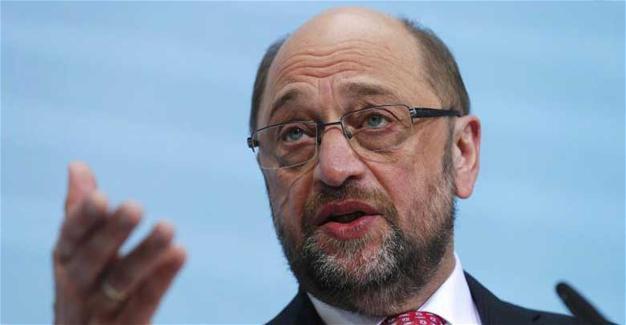Germany’s Schulz sees ‘rocky road’ to election after key state defeat
 Germany’s Social Democrat chief Martin Schulz acknowledged on May 15 that his party faced a “rocky road” to national elections, after it was soundly beaten in a key state by Chancellor Angela Merkel’s party.
Germany’s Social Democrat chief Martin Schulz acknowledged on May 15 that his party faced a “rocky road” to national elections, after it was soundly beaten in a key state by Chancellor Angela Merkel’s party.The chancellor, meanwhile, hailed the strong victory in North Rhine-Westphalia (NRW) on May 14 and vowed to do “everything we can” to ensure that her party also prevails in general elections set for Sept. 24.
Schulz’s SPD won just 31.2 percent of the votes, well below the 39.1 percent it garnered five years ago, final results showed.
Merkel’s Christian Democrats (CDU) saw a surge in support, winning 33 percent, up from 26.3 percent in 2012.
The CDU focused its campaign in the state, for decades an SPD stronghold, on attacking the SPD for failing to tackle local issues like crumbling infrastructure that causes huge traffic jams, rising crime and an underperforming education system.
It was not clear whether the liberal Free Democrats (FDP), the CDU’s preferred partners projected to win 12 percent, had enough votes for the two allies to form a majority in the state.
What was clear is that the ruling SPD-Greens coalition fell far short of a majority as the Greens won about 6 percent, down from 11.3 percent in 2012. The far-right Alternative for Germany (AfD), which has no coalition allies, won 7.5 percent.
Merkel said her party would now gear up for the national campaign.
“We are aware that this new phase will be an exhausting one,” she said, but added that the grand right-left coalition led by her party has a good record to show.
Schulz, for his part, admitted that “we suffered a difficult moment last night.”
“One thing that is totally clear is that, before general elections on Sept. 24, we’ll have a long way to go. It is a rocky road, but the SPD is a battle-hardened party and we will put up a fight in the elections,” he said.
With a fifth of Germans -- 13.1 million -- eligible to vote in North Rhine-Westphalia, elections in the western state are closely watched for hints to the federal outlook.
It carried even higher stakes this year, being the last regional vote before the national election and having a direct impact on the SPD’s ability to close a nationwide gap of around 10 percentage points with the CDU.
Merkel, whose re-election hopes earlier this year seemed to be uncertain due to the initial popularity of Schulz when he took over the SPD leadership, managed to revive her fortunes over the last two months with a victory in Saarland on March 26 and an upset defeat of the ruling SPD in Schleswig-Holstein.
The CDU unseated the SPD in North Rhine-Westphalia in May 2005, prompting a snap federal election. The conservatives won the national election, giving Merkel her first term as chancellor.
The SPD has ruled NRW for 46 of the last 51 years. The CDU only ruled in NRW for five years during that half century, from 2005 until 2010.
SPD state premier Hannelore Kraft quickly conceded defeat and said she would stand down as her party’s local leader.
“It’s sad we lost so many districts. I take personal responsibility for this defeat ...,” she said.
















